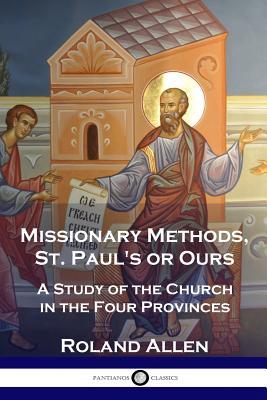Roland Allen discusses how to conducts successful missions, comparing his own church's methods with the historical descriptions of the famous missionary of yore, St. Paul.
Comprehensive and instructional, this book seeks to show the interested reader how an effective Christian mission is planned and undertaken. Practical elements include the selection of a location, and an evaluation of the social and moral condition of the local area. The author attempts to draw comparisons with St. Paul's own circumstances; the world is shown to have moved on in many respects, with conditions such as slavery far rarer in modernity than the distant past.
Chapters are dedicated to matters such as the teaching of the gospels - the classic Christian missionary texts to instruct upon are those of Matthew, Mark, Luke and John. A expert narration of Christ's life and lessons, reliably told from memory and sufficient to capture and hold the interest of listeners, is shown to be of essential use on most any mission.
Latterly, we are told of the importance of organization and finance. The modern church, if it is to last long and take root in a faraway place, must be run with prudence. Whereas the Christianity of St. Paul's day was not nearly as organized, the modern church - operating over distances far vaster and in differing cultures - must be stringent in its hierarchy and allocation of funds.
In all, Roland Allen offers here a thought-provoking and practical guide to missions, with extensive and due reference and comparison to the historical deeds of St. Paul.

Missionary Methods, St. Paul's or Ours: A Study of the Church in the Four Provinces
Roland Allen discusses how to conducts successful missions, comparing his own church's methods with the historical descriptions of the famous missionary of yore, St. Paul.
Comprehensive and instructional, this book seeks to show the interested reader how an effective Christian mission is planned and undertaken. Practical elements include the selection of a location, and an evaluation of the social and moral condition of the local area. The author attempts to draw comparisons with St. Paul's own circumstances; the world is shown to have moved on in many respects, with conditions such as slavery far rarer in modernity than the distant past.
Chapters are dedicated to matters such as the teaching of the gospels - the classic Christian missionary texts to instruct upon are those of Matthew, Mark, Luke and John. A expert narration of Christ's life and lessons, reliably told from memory and sufficient to capture and hold the interest of listeners, is shown to be of essential use on most any mission.
Latterly, we are told of the importance of organization and finance. The modern church, if it is to last long and take root in a faraway place, must be run with prudence. Whereas the Christianity of St. Paul's day was not nearly as organized, the modern church - operating over distances far vaster and in differing cultures - must be stringent in its hierarchy and allocation of funds.
In all, Roland Allen offers here a thought-provoking and practical guide to missions, with extensive and due reference and comparison to the historical deeds of St. Paul.